In this, the first of a series of reports about Ziad Takieddine, Mediapart exclusively reveals photos testifying to the hitherto undisclosed and even secret links between the 61 year-old businessman and the inner circle surrounding French President Nicolas Sarkozy.
Those concerned are Brice Hortefeux, a former immigration minister and, from 2009 until February this year, Minister of the Interior; Thierry Gaubert, a former political aide to Nicolas Sarkozy before he became president; Jean-François Copé, the current leader (general secretary) of Sarkozy's ruling centre-right UMP party and a former budget minister; and Dominique Desseigne, the chairman and managing director of the Lucien Barrière Group of luxury hotels and casinos.
A number of documents also attest to sustained relations between arms broker Takieddine and Claude Guéant, the current French interior minister and a longstanding and close ally of Sarkozy's. Other documents relate directly to past French foreign policy and the establishment of a remarkable reconciliation with the regime of Colonel Muammar Gaddafi in Libya - to a backdrop of major business contracts.
Mediapart can also reveal that Takieddine, who holds both French and Lebanese nationalities, received payment totaling a value of 91 million euros between 1997 and 1998 from a sale of French frigates to Saudi Arabia, a contract authorized in 1994 by Nicolas Sarkozy when he was budget minister. Other documents consulted by Mediapart indicate that Takieddine, as of 2003, organized what are described as "secret payments" from offshore bank accounts amounting to 11.8 million euros.
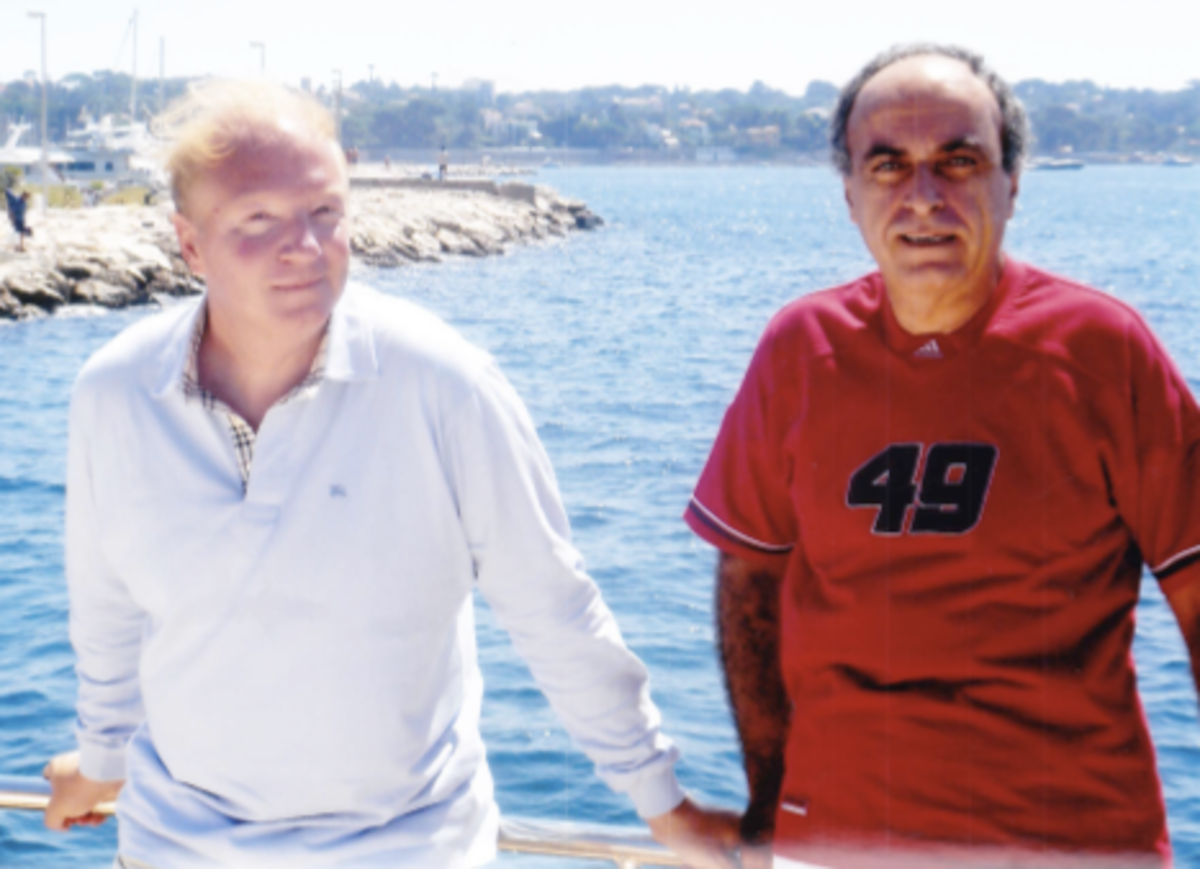
On March 5th 2011, Takieddine was held for questioning by customs officers after arriving at Le Bourget airport from Libya in a private plane in which was discovered 1.5 million euros in cash. Also aboard the aircraft were two journalists from the French weekly paper, le Journal du Dimanche, who were returning from Tripoli after an interview with Colonel Gaddafi.
A preliminary investigation was immediately opened into "suspected money laundering" and "failure to abide by required declarations". Takieddine told the customs officers that the money onboard the plane was from "a transfer between commercial companies". Reportedly furious over his arrest, Takieddine made a phone call to Thierry Gaubert in which he threatened to "blow-up the government". The result of the customs investigation has not been revealed.
More recently, on July 7th, the French police force's National Division of Financial Investigations (DNIF) carried out a search of Gaubert's home as part of the investigations led by examining magistrates Renaud Van Ruymbeke and Roger Le Loire into suspected illegal kickback payments from the 1994 sale of three French Agosta class submarines to Pakistan.
Several witnesses questioned by the magistrates have designated Takieddine as an intermediary in the 1994 contract who was imposed by the then-government of Edouard Balladur. The magistrates are notably investigating whether some of the significant sums officially destined as commissions - or bribes - to Pakistani officials ended up returning, illegally, to France, in what are called retro-commissions, to fund Balladur's political movement and unsuccessful 1995 presidential election campaign. Balladur's then-budget minister Nicolas Sarkozy also served as his official campaign spokesman.
This is the key to what has become known as ‘the Karachi affair', so-called after the 2002 murders of 11 French naval engineers who were helping build one of the three submarines in the Pakistani port city. Their deaths, in a bomb attack on their mini-bus, are the subject of a separate ongoing judicial investigation. The credited lead in that enquiry is that the engineers were the victims of a revenge attack for the non-payment of commissions surrounding the deal, halted immediately after Balladur's political rival Jacques Chirac beat him to the presidency in 1995. It is suspected that Chirac's decision to cut off the retro-commissions allegedly destined for Balladur's activities also involved the halting of payments promised to local officials. (For more on this far-reaching affair, see our Q&A guide here and a video presentation here).
Ziad Takieddine and Thierry Gaubert met during Balladur's presidential campaign. Gaubert had worked under Nicolas Sarkozy when the latter was mayor of the town of Neuilly, just west of Paris. When Sarkozy became Balladur's budget minister (from 1993 to 1995), Gaubert served a minor role in his ministerial communications team.
Around this same period, Takieddine became close to Balladur's defence minister, François Léotard, and his wife. The three first met when Takieddine was manager, until 1992, of the Isola 2000 mountain resort in south-east France where the Léotard couple enjoyed skiing. By the time the Balladur government was dissolved for the elections in May 1995, Takieddine's financial activities had grown considerably thanks to arms contracts signed during its mandate.
Yachting about with ministers
Ziad Takieddine is one of a clan, and which he enjoys bringing together for important occasions. Thus, on June 20th, 2002, he organized a sumptuous dinner to celebrate the victory of the French conservative right in presidential and legislative elections held weeks earlier (1). The return to power of a conservative right government also saw former supporters of Balladur, a bitter rival and enemy of Chirac's, appointed as ministers. This reconciliation of sorts ended a seven-year feud after Balladur and his entourage, notably Nicolas Sarkozy, had split the right by running against Chirac and his camp in the 1995 presidential elections.
Among Takieddine's guests that evening was Renaud Donnedieu de Vabres, one of Balladur's 1995 election campaign team and who had just been appointed as European affairs minister, and who would later become Minister of Culture and Communications. Also present was Jean-François Copé, then just appointed as state secretary for relations with parliament. Copé, who had served as a junior minister in Balladur's 1993-1995 government, later joined Chirac's camp although he was overlooked for a government role until 2002. (2)
Other guests included Brice Hortefeux, a member of recently-appointed interior minister Nicolas Sarkozy's team, UMP Member of Parliament Christian Estrosi, and Thierry Gaubert. The latter was at that time distanced from political activity since he became a suspect in an investigation into the misappropriation of public funds involving public housing funding in the Hauts-de-Seine département (equivalent to a county) west of Paris. Finally, there were also Etienne Mougeotte, then vice-chairman of French television channel and media organization TF1, and Thierry Dassault, son of Serge Dassault, chairman of aircraft manufacturers Dassault Aviation.
This group close to Nicolas Sarkozy regularly meet in Takieddine's house in Cap d'Antibes, on the French Riviera. In August 2003, Jean-François Copé and Brice Hortefeux and their spouses enjoyed a day out sailing the Mediterranean on Takieddine's yacht 'La Diva', when the photo published below was taken.
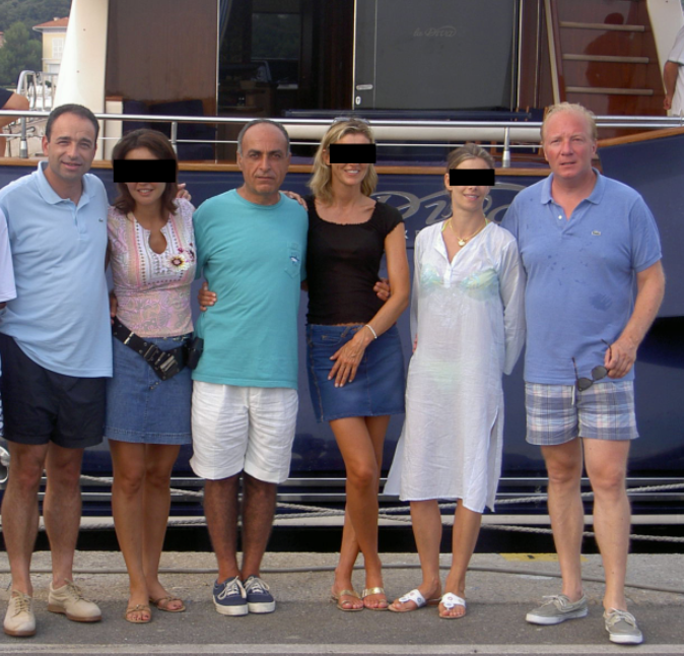
Enlargement : Illustration 2

Contacted by Mediapart, Hortefeux said: "I have only been once or twice to his place, and I wasn't in government. He invited everybody to a grand dinner [party]. I might have gone out in a boat, but I didn't go on a cruise with him." Some have enjoyed lengthy stays in Takieddine's Cap d'Antibes villa, including Jean-François Copé, pictured there below on August 13th 2003.
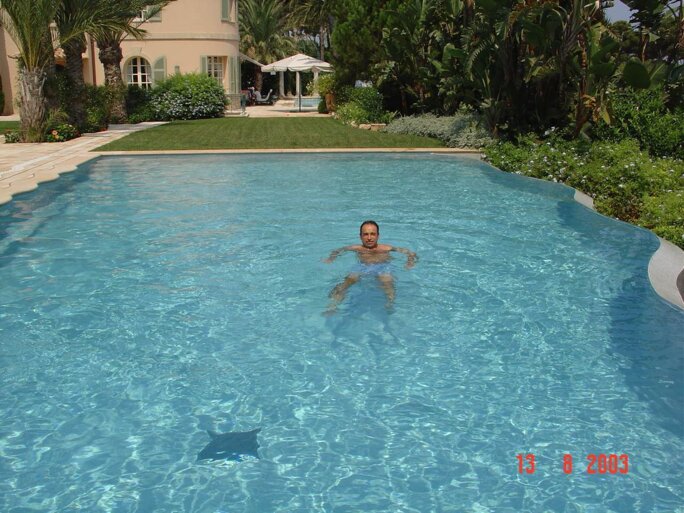
Enlargement : Illustration 3

Mediapart has obtained information indicating that Takieddine, via a company called Translebanon, also picked up the cost for trips by Copé and his wife to London and Venice, in October 2004 when Copé was junior minister with the interior ministry, and a separate trip to London in October 2005, when he was budget minister. In October 2003, Takieddine offered Copé, then the French government spokesman and Secretary of State for Relations with Parliament, a visit of the Lebanon, when the picture below was taken.
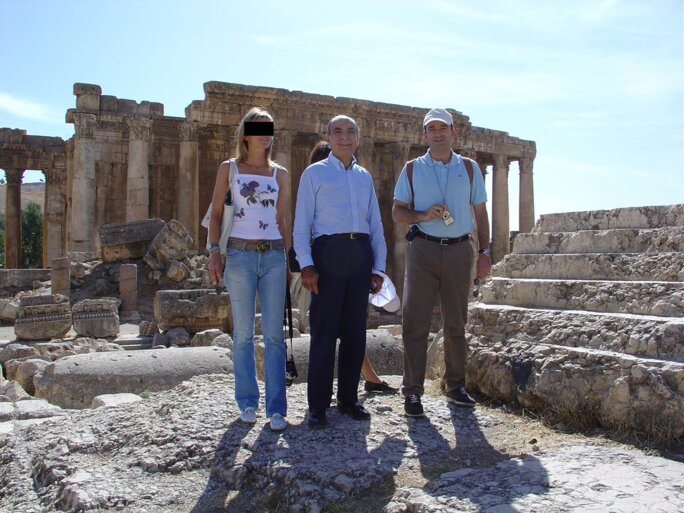
Enlargement : Illustration 4

Contacted by Mediapart, Copé confirmed that he had been "invited" by Takieddine on several occasions, as part of "strictly amicable relations" that were "without any link" with his "elective or ministerial activities".
During the trip to the Lebanon, Copé and Takieddine enjoyed dinner at the residence of the then-French ambassador, Philippe Lecourtier. "The trip did indeed involve an official part and an amicable part," commented a source close to Copé on Sunday.
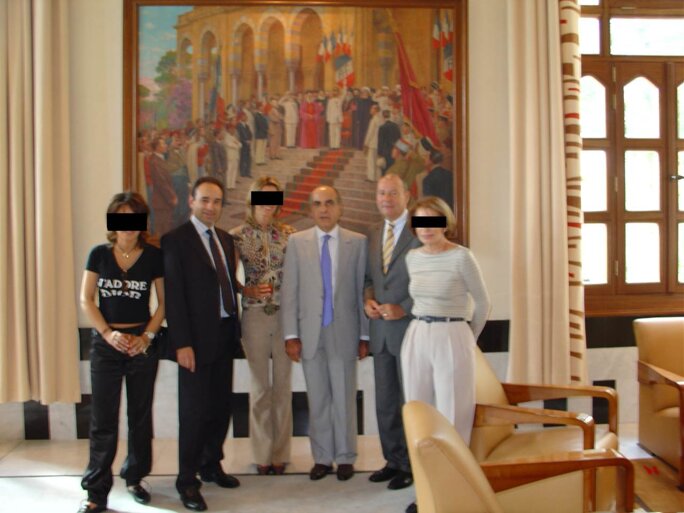
Enlargement : Illustration 5

Furthermore, documents relating to Takieddine's accounts and consulted by Mediapart record a "credit" note concerning "the Copé family" amounting to 19,050 euros and dated April 7th 2004. Contacted by Mediapart, Copé's UMP party staff could offer no explanation of this, nor whether the amount had been refunded. "We don't see what it corresponds with," commented one member of his staff.
-------------------------
1: The 2002 presidential elections saw incumbent Jacques Chirac elected back into office in a second-round victory in May. Chirac's conservative right UMP party and its centre right allies were swept to power in a landslide victory over the outgoing Socialist Party-led government in ensuing legislative elections in June. From 1997 to 2002, Chirac shared political power with socialist Prime Minister Lionel Jospin in a political arrangement known as ‘cohabitation'.
2: After Jacques Chirac was elected president for the first time in May 1995, ensuing legislative elections in June returned a parliamentary majority for Chirac's RPR party (which was later dissolved to form the UMP). Chirac's close political aide Alain Juppé (now foreign affairs minister) was prime minister between 1995 and 1997, when early legislative elections were called and in which the Socialist Party gained a majority of seats.
Contacts and contracts
The name of Pierre Charon, then adviser to Nicolas Sarkozy at the interior ministry, also figures on the same statement of accounts obtained by Mediapart. But the sum in question here is so comparatively small - 110.13 euros - it is surprising that it even shows up on the statement. Pierre Charon said he cannot remember what this referred to, although he does admit having met the middleman "two or three times", including "one time on the coast". "He was an acquaintance in common among friends of Brice's," Charon told Mediapart.
Featured guests on another outing on ‘La Diva', pictured below, were Thierry Gaubert and Dominique Desseigne, heir to the Barrière luxury hotel and casino group and owner of the luxury restaurant Fouquet's, where Nicolas Sarkozy was later to celebrate his election victory in May 2007. Back in the 1980s, Desseigne had married Thierry Gaubert's ex-wife, Diane Barrière, who died in 2001 from injuries sustained in a plane crash.
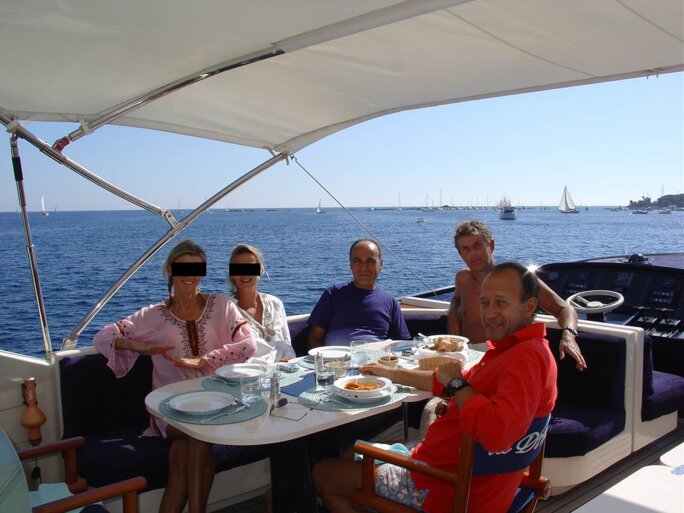
Enlargement : Illustration 6

Importantly, at the time of this outing, Ziad Takieddine was plying the French ministry of the interior, then headed by Nicolas Sarkozy, for government contracts - coupled with secret deals for his remuneration.
The fattest prospective deal at the time was the so-called ‘Saudi Border Guards Development Program', code named ‘Miksa', with an estimated value of 7 billion euros. But in December 2003, then-president Jacques Chirac stepped in to stop the interior ministry in its negotiations. Chirac went as far as to block plans for a preparatory trip to Saudi Arabia and ultimately took the interior ministry off the matter.
Inside the ministry, the Miksa contract was being handled directly by two men: Brice Hortefeux and Claude Guéant, working hand in hand with Ziad Takieddine. "I was in touch with him only for the Miksa deal, which finally didn't happen," said Hortefeux, who admits having undertaken one of the negotiating trips to Saudi Arabia. "Ziad Takieddine had contacts with the authorities," recalled the ex-minister. "Was he useful to the country? Perhaps so."
Saudi Arabia had proved a place of luck and fortune for Ziad Takieddine in the past. He had played a crucial role in two major arms deals from 1993 to 1995, one being the submarine contract with Pakistan, the other a sale of three French La Fayette frigates to Saudi Arabia, also in 1994, in a deal codenamed Sawari II.
'Secret payments' worth11.8 million euros
However, these two deals shared the same fate after Jacques Chirac was elected president in 1995: suspecting that the contracts were feeding his conservative right rival Édouard Balladur with a slush fund, Chirac, in the summer of 1996 stopped payments of outstanding commissions to the suspected network of middlemen. That appeared to be bad news for Takieddine.
But according to previously undisclosed documents now obtained by Mediapart, the Franco-Lebanese businessman ultimately received a sizeable chunk of the cut he had been expecting for the sale of the warships. After taking the matter to arbitration in late 1996, he succeeded in obtaining $130 million in three instalments paid into a "secret account", listed as No 3585 at the Banque De La Méditerranée (now BankMed) in Beirut (see document further below). The sums were $75 million paid on April 7th 1997, $25 million paid on December 31st 1997 and another $30 million paid on May 31st 1998.
These funds were promptly divided up among other offshore companies, notably Estar Ltd, the beneficiary of several "consultancy" contracts signed in 1995 with Sofresa, an arms office belonging to the French government. Ziad Takieddine now says the payments were unfrozen when former Lebanese prime minister Rafic Hariri, assassinated in 2005, intervened on his behalf with Jacques Chirac.
Click on the document below for full-screen viewing:

Enlargement : Illustration 7

It was the receipt of these funds that subsequently enabled Takieddine to make the bulk of his huge property purchases beginning in 1998, including a private mansion in Paris, a townhouse in London and his Riviera villa in Cap d'Antibes.
An itemized statement of his expenditures includes an entry labelled "secret payments" - which total 11.8 million euros between 2003 and 2008.
Click on image to enlarge:

Enlargement : Illustration 8

Contacted by Mediapart on Sunday July 10th about these secret payments and the outings with leading political and business figures on his private yacht, Ziad Takieddine refused to answer our questions. "What do you want? You want to bring down a French president? Well then do it, in your way," he responded. "I have nothing to tell you, except to sue you."
"Go and see what Villepin (1) got," he added, without elaborating. "I'm a clean man and you're dirty. You're one of the filthy who are most productive in the muck."
-------------------------
1: Dominque de Villepin, French Prime Minster under Jacques Chirac from 2005 to 2007, and a longstanding Chirac loyalist. A bitter rivalry exists between Villepin and Nicolas Sarkozy, and there is speculation that Villepin may stand as a centre-right candidate against Sarkozy in the 2012 presidential elections.
English version by Eric Rosencrantz and Graham Tearse
(Editing by Graham Tearse)


